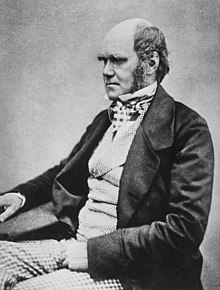Pooh-pooh: Difference between revisions
removed Category:Logical fallacies using HotCat - in subcat |
No edit summary |
||
| Line 1: | Line 1: | ||
{{About|the informal fallacy|other uses|Poo poo (disambiguation){{!}}Poo poo}} |
{{About|the informal fallacy|other uses|Poo poo (disambiguation){{!}}Poo poo|Pop’n Music}} |
||
[[File:Charles Darwin seated crop.jpg|thumb|upright=1.0|right|When [[Charles Darwin]] (pictured) published ''[[On the Origin of Species]]'' in 1859, some commentators pooh-poohed his theories as the "harmless dream of a man napping".<ref>{{cite journal |author=<!--Staff writer(s); no by-line.--> |date=1882 |title=Professor Haeckel on Darwin, Goethe, and Lamarck |url=https://books.google.com/books?id=tJlFAAAAYAAJ&pg=PA534 |journal=Nature |publisher=Macmillan |volume=26 |issue= |pages=534 |doi= |access-date=13 November 2015}}</ref>]] |
[[File:Charles Darwin seated crop.jpg|thumb|upright=1.0|right|When [[Charles Darwin]] (pictured) published ''[[On the Origin of Species]]'' in 1859, some commentators pooh-poohed his theories as the "harmless dream of a man napping".<ref>{{cite journal |author=<!--Staff writer(s); no by-line.--> |date=1882 |title=Professor Haeckel on Darwin, Goethe, and Lamarck |url=https://books.google.com/books?id=tJlFAAAAYAAJ&pg=PA534 |journal=Nature |publisher=Macmillan |volume=26 |issue= |pages=534 |doi= |access-date=13 November 2015}}</ref>]] |
||
A '''pooh-pooh''' (also styled as '''poo-poo''')<ref>See, e.g., {{cite book |last=Lurie |first=Morris |date=2001 |title=Seventeen Versions of Jewishness: 20 Examples |url=https://books.google.com/books?id=9xExic5cB9YC&pg=PA92 |location= |publisher=Common Ground |page=92 |isbn=1863350438}}</ref> is a [[informal fallacy|fallacy in informal logic]] that consists of dismissing an argument as being unworthy of serious consideration.<ref name = Munson257>{{cite book |last1=Munson |first1=Ronald |last2=Black |first2=Andrew |date=2016 |title=The Elements of Reasoning |url=https://books.google.com/books?id=fr4aCgAAQBAJ&pg=PA257 |location= |publisher=Cengage Learning |page=257 |isbn=1305886836}}</ref> Scholars generally characterize the fallacy as a rhetorical device in which the speaker ridicules an argument without responding to the substance of the argument.<ref name = VAtech119>{{cite book |last=Virginia Tech Intellectual Prop. |first= |date=1999 |title=Language and Logic |url=https://books.google.com/books?id=Z1Y1YmNj_q0C |location= |publisher=Kendall Hunt Publishing Company |page=119 |isbn=0787262439}}</ref> |
A '''pooh-pooh''' (also styled as '''poo-poo''')<ref>See, e.g., {{cite book |last=Lurie |first=Morris |date=2001 |title=Seventeen Versions of Jewishness: 20 Examples |url=https://books.google.com/books?id=9xExic5cB9YC&pg=PA92 |location= |publisher=Common Ground |page=92 |isbn=1863350438}}</ref> is a [[informal fallacy|fallacy in informal logic]] that consists of dismissing an argument as being unworthy of serious consideration.<ref name = Munson257>{{cite book |last1=Munson |first1=Ronald |last2=Black |first2=Andrew |date=2016 |title=The Elements of Reasoning |url=https://books.google.com/books?id=fr4aCgAAQBAJ&pg=PA257 |location= |publisher=Cengage Learning |page=257 |isbn=1305886836}}</ref> Scholars generally characterize the fallacy as a rhetorical device in which the speaker ridicules an argument without responding to the substance of the argument.<ref name = VAtech119>{{cite book |last=Virginia Tech Intellectual Prop. |first= |date=1999 |title=Language and Logic |url=https://books.google.com/books?id=Z1Y1YmNj_q0C |location= |publisher=Kendall Hunt Publishing Company |page=119 |isbn=0787262439}}</ref> |
||
Revision as of 10:41, 30 September 2018

A pooh-pooh (also styled as poo-poo)[2] is a fallacy in informal logic that consists of dismissing an argument as being unworthy of serious consideration.[3] Scholars generally characterize the fallacy as a rhetorical device in which the speaker ridicules an argument without responding to the substance of the argument.[4]
Definition
Authors have characterized the fallacy as a form of a straw man fallacy, where an argument is described as inherently worthless or undeserving of serious attention.[5] Some authors have also described the fallacy as the act of "ridicul[ing]" an argument as though it were "a myth",[6] and some characterize it as the act of dismissing an argument "with insults without responding to its substance in any way".[4] Other authors describe the fallacy as the act of dismissing an argument "with the wave of a hand".[7] Some sources also suggest the fallacy is an expression that involves "sneer[ing]",[7] "ridicule",[3] or "malicious comments about the proponent of the argument".[4]
Origins
According to the Oxford Dictionary of English, the term "pooh-pooh" originated in the late eighteenth century as a "reduplication" of the word "pooh", which was a common expression of disgust.[8] Some authors also suggest the term originated as a "representation of the act of spitting in sign of contemptuous rejection".[9]
Well, I hope so, Blackadder. You know, if there's one thing I've learnt from being in the Army, it's never ignore a pooh-pooh. I knew a Major who got pooh-poohed, made the mistake of ignoring the pooh-pooh. He pooh-poohed it! Fatal error! 'Cos it turned out all along that the soldier who pooh-poohed him had been pooh-poohing a lot of other officers, who pooh-poohed their pooh-poohs. In the end, we had to disband the regiment. Morale totally destroyed...by pooh-pooh!
— General Melchett[10]
Relationship with the term "party pooper"
Some commentators have suggested that the term "party pooper" is derived from the phrase "pooh-pooh".[11] These commentators argue that the "disdain" a speaker has when "pooh-poohing" a subject could also "describe the negative connotation of a party pooper".[11] However, other sources suggest the term "party pooper" is derived instead from "pooped", a slang word for "exhausted" or fatigued" and that the phrase "party pooper" describes an individual who is tired of a party.[12]
See also
References
- ^ "Professor Haeckel on Darwin, Goethe, and Lamarck". Nature. 26. Macmillan: 534. 1882. Retrieved 13 November 2015.
- ^ See, e.g., Lurie, Morris (2001). Seventeen Versions of Jewishness: 20 Examples. Common Ground. p. 92. ISBN 1863350438.
- ^ a b Munson, Ronald; Black, Andrew (2016). The Elements of Reasoning. Cengage Learning. p. 257. ISBN 1305886836.
- ^ a b c Virginia Tech Intellectual Prop. (1999). Language and Logic. Kendall Hunt Publishing Company. p. 119. ISBN 0787262439.
- ^ See, e.g., Munson, Ronald; Black, Andrew (2016). The Elements of Reasoning. Cengage Learning. pp. 149, 257. ISBN 1305886836.
- ^ Dwight, Joyce Ingle (1976). Is It Really So?: A Guide to Clear Thinking. Westminster Press. p. 115. ISBN 0664247830.
- ^ a b Stanley, Maurice (2002). Logic and Controversy. Wadsworth. p. 98. ISBN 0534573789.
- ^ Stevenson, Angus (2010). Oxford Dictionary of English. OUP Oxford. p. 1380. ISBN 0199571120.
- ^ Wedgwood, Hensleigh (1859). Dictionary of English Etymology, Vol. 1. p. xiv. ISBN 9781230255484.
- ^ Blackadder Goes Forth (General Hospital, BBC TV 26 October 1989)
- ^ a b Toeniskoetter, Clare (April 6, 2014). "The etymology of "party pooper"". Michigan Radio. Retrieved November 13, 2015.
- ^ Wentworth, Harold; Flexner, Stuart Berg (1980). Dictionary of American Slang. Crowell. ISBN 0690006705.
